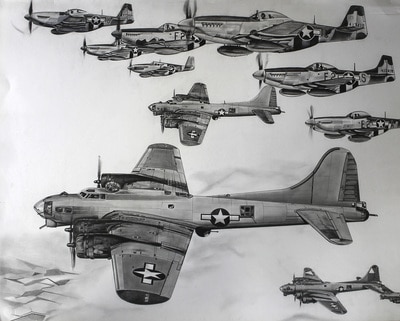Throughout an auspicious 30 year career, artist Richard Davis has always striven to create art in the service of others. Now this Spring Hill resident strives to morph this mission into a legacy.
A look through Davis’ extensive portfolio will reveal a vast variety of media, including oil and watercolors, colored pencils, acrylics, murals and photography, and subjects ranging from military planes, classic movie stars and United States presidents to wildlife to Civil War themes. His list of artistic patrons and clients is every bit as diverse, as he has been commissioned to complete work for everyone from the US Air Force to McDonalds, Texas Instruments to the American Dental Association. His work has appeared at the Pentagon and the US Capitol.
“I’ve done artwork for major companies,” he said. “History is what I love.”
A second look at Davis’ portfolio reveals another recurring theme: Epilepsy.
Davis has battled this disease for most of his life. It was Epilepsy that prevented this proud member of a military family from enlisting himself.
“I love my country,” said Davis, whose portrait subjects have ranged from George Washington to an American eagle, Civil War battle scenes to wartime battle planes. “And since I couldn’t serve in the military, I thought I could serve through my art.”
Epilepsy has robbed Davis of so much more, claiming the life of his son (who passed in the wake of a seizure), and threatening his artistic ability–at one point temporarily robbing him of his ability to draw.
“I threw down my pencil and cried,” he recalls. “Then I picked up my pencil and tried again.”
In the fight against Epilepsy, Davis always has counted coming back and giving back among his primary weapons. He has donated artwork to Very Special Arts in Washington, DC (an organization that supports artists facing various physical challenges), and the Epilepsy Foundation, Landover, MD.
He also prepared a comprehensive artbook featuring famous people who lived with Epilepsy. Yet as the years wear on, it becomes more and more challenging for Davis to pursue his artistic passions. He fights exhaustion, vertigo, and worsening seizures as he stays steadfast at his art desk, continuing to create.
“I’ve had seizures that have nearly killed me,” he said. “I can’t go to art shows anymore.”
Davis’ doctors have told him that he has limited options available to him in terms of treatment and medication. And while he is at this point unaware of his life expectancy, he has no doubt as to the focus of his lifetime legacy.
“I have so much artwork piled up in boxes, as I’ve been unable to show and sell it,” he said. “I want to use it to help people.”
With the dawn of the COVID-19 pandemic, Davis has found a focus for his helping efforts. He is in search of a charity, a help group, or a philanthropic business that will sell his artwork–with part of the proceeds going to support either COVID-19 sufferers, or those who have lost work because of the pandemic.
The art available for purchase comes in all sizes and media, and ranges from a classically beautiful painting of a Civil War mother writing a letter to her son at war and poignant pencil drawings of soldiers on the battlefield, to slick, colorful car art posters and renderings of timeless movie star Marilyn Monroe.
Any agency, business or organization that wishes to support Davis in the sale of his art can contact him at [email protected].
Truly timeless is the legacy that Davis hopes to leave; a legacy of helping.
“I want to show my art, share my art,” he said. “I want to use my art to help people now.”

